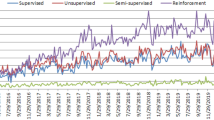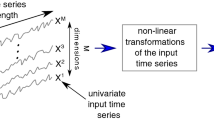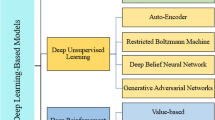Abstract
Grid-connected plug-in electric vehicle charging stations having integrated renewable energy sources like photovoltaic (PV) systems with battery energy storage help manage the variability of electric vehicle charging load and reduce the stress on the grid. Such charging stations will benefit from short to medium term forecasting of load demand, as it allows them to optimize the operation through better utilization of the PV and battery stored energy rather than relying on the grid. The load forecasting accuracy has a direct correlation with the degree of optimization achievable. Deep learning network is a form of artificial neural network which can be effectively used for time series forecasting. In this paper, some of the widely researched deep learning models such as long short-term memory (LSTM), gated recurrent units (GRU), hybrid of convolution neural network (CNN) and LSTM, hybrid of CNN and GRU, multivariate LSTM and multivariate GRU are analyzed for fitment for the charging load forecasting problem. The datasets available from multiple charging stations in a region are used for training the models. The predictions made using these models and their performances are analyzed using standard metrics and are presented.












Similar content being viewed by others
References
S. Goel, R. Sharma, A.K. Rathore, A review on barrier and challenges of electric vehicle in India and vehicle to grid optimization. Transport. Eng. 4, 100057 (2021). https://doi.org/10.1016/j.treng.2021.100057
P.-Y. Kong, G.K. Karagiannidis, Charging schemes for plug-in hybrid electric vehicles in smart grid: a survey. IEEE Access 4, 6846–6875 (2016)
V. Gupta, S.R. Konda, R. Kumar, B.K. Panigrahi, Collaboratie multi-aggregator electric vehicle charge scheduling with PV-assisted charging stations under variable solar profiles. IET Smart Grid 3(3), 287–299 (2020)
S. Negarestani, M. Fotuhi-Firuzabad, M. Rastegar, A. Rajabi-Ghahnavieh, Optimal sizing of storage system in a fast charging station for plug-in hybrid electric vehicles. IEEE Trans. Transport. Electrif. 2(4), 443–453 (2016)
A.A. Mamun, M. Sohel, N. Mohammad, M.S. Haque Sunny, D.R. Dipta, E. Hossain, A comprehensive review of the load forecasting techniques using single and hybrid predictive models. IEEE Access 8, 134911–134939 (2020)
Q. Sun, J. Liu, X. Rong, M. Zhang, X. Song, Z. Bie, Z. Ni, Charging load forecasting of electric vehicle charging station based on support vector regression, in 2016 IEEE PES Asia-Pacific Power and Energy Conference—Xi'an—China
L. Buzna, P. De Falco, S. Khormali, D. Proto, M. Straka, Electric vehicle load forecasting: a comparison between time series and machine learning approaches, in 1st International Conference on Energy Transition in the Mediterranean Area SyNERGY MED 2019
S. Shahriar, A.R. Al-Ali, A.H. Osman, S. Dhou, M. Nijim, Machine learning approaches for EV charging behavior: a review. IEEE Access 8, 168980–168993 (2020)
Y. Hong, Y. Zhou, Q. Li, W. Xu, X. Zheng, A deep learning method for short-term residential load forecasting in smart grid. IEEE Access 8, 55785–55797 (2020)
B. Farsi, M. Amayri, N. Bouguila, U. Eicker, On short-term load forecasting using machine learning techniques and a novel parallel deep LSTM-CNN approach. IEEE Access 9, 31191–31212 (2021)
M. Tan, S. Yuan, S. Li, Y. Su, H. Li, F. He, Ultra-short-term industrial power demand forecasting using LSTM based hybrid ensemble learning. IEEE Trans. Power Syst. 35(4), 2937–2948 (2020)
J. Zhu, Z. Yang, Y. Chang, Y. Guo, K. Zhu, J. Zhang, A novel LSTM based deep learning approach for multi-time scale electric vehicles charging load prediction, in 2019 IEEE PES Innovative Smart Grid Technologies Asia
S Yang, X Yu, Y Zhou, LSTM and GRU neural network performance comparison study, in 2020 International Workshop on Electronic Communication and Artificial Intelligence (IWECAI)
M. Sajjad et al., A novel CNN-GRU-based hybrid approach for short-term residential load forecasting. IEEE Access 8, 143759–143768 (2020)
R. Ghanbari, K. Borna, Multivariate time-series prediction using LSTM neural networks, in 26th International Computer Conference 2021, Computer Society of Iran, Tehran, Iran
Z.J. Lee, T. Li, S.H. Low, ACN-data: analysis and applications of an open EV charging dataset, in Proceedings of Proceedings of the Tenth ACM International Conference on Future Energy Systems, Phoenix, AZ, USA, June 25–28, 2019 (e-Energy ’19) (2019), p. 12. https://doi.org/10.1145/3307772.3328313
L. Guo, P. Shi, Y. Zhang, Z. Cao, Z. Liu, B. Feng, Short-term EV charging load forecasting based on GA-GRU model, in 2021 The 3rd Asia Energy and Electrical Engineering Symposium
Funding
The author(s) received no external financial support for the research, authorship, and/or publication of this article.
Author information
Authors and Affiliations
Corresponding author
Ethics declarations
Conflict of interest
The authors declare that they have no conflict of interest.
Additional information
Publisher's Note
Springer Nature remains neutral with regard to jurisdictional claims in published maps and institutional affiliations.
Rights and permissions
Springer Nature or its licensor (e.g. a society or other partner) holds exclusive rights to this article under a publishing agreement with the author(s) or other rightsholder(s); author self-archiving of the accepted manuscript version of this article is solely governed by the terms of such publishing agreement and applicable law.
About this article
Cite this article
P Sasidharan, M., Kinattingal, S. & Simon, S.P. Comparative Analysis of Deep Learning Models for Electric Vehicle Charging Load Forecasting. J. Inst. Eng. India Ser. B 104, 105–113 (2023). https://doi.org/10.1007/s40031-022-00798-4
Received:
Accepted:
Published:
Issue Date:
DOI: https://doi.org/10.1007/s40031-022-00798-4




